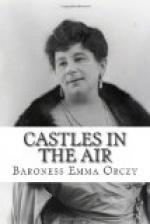To begin with, I set to work to make a copy of the treaty on my own account. I have brought the study of calligraphy to a magnificent degree of perfection, and the writing on the document was easy enough to imitate, as was also the signature of our gracious King Louis and of M. de Talleyrand, who had countersigned it.
If you remember, I had picked up two or three loose sheets of paper off M. de Marsan’s desk; these bore the arms of the Chancellerie of Foreign Affairs stamped upon them, and were in every way identical with that on which the original document had been drafted. When I had finished my work I flattered myself that not the greatest calligraphic expert could have detected the slightest difference between the original and the copy which I had made.
The work took me a long time. When at last I folded up the papers and slipped them once more inside my blouse it was close upon two. I wondered why Theodore had not returned with our luncheon, but on going to the little anteroom which divides my office from the outer door, great was my astonishment to see him lolling there on the rickety chair which he affectioned, and half asleep. I had some difficulty in rousing him. Apparently he had got rather drunk while he was out, and had then returned and slept some of his booze off, without thinking that I might be hungry and needing my luncheon.
“Why didn’t you let me know you had come back?” I asked curtly, for indeed I was very cross with him.
“I thought you were busy,” he replied, with what I thought looked like a leer.
I have never really cared for Theodore, you understand.
However, I partook of our modest luncheon with him in perfect amity and brotherly love, but my mind was busy all the time. I began to wonder if Theodore suspected something; if so, I knew that I could not trust him. He would try and ferret things out, and then demand a share in my hard-earned emoluments to which he was really not entitled. I did not feel safe with that bulky packet of papers on me, and I felt that Theodore’s bleary eyes were perpetually fixed upon the bulge in the left-hand side of my coat. At one moment he looked so strange that I thought he meant to knock me down.
So my mind was quickly made up.
After luncheon I would go down to my lodgings at Passy, and I knew of a snug little hiding-place in my room there where the precious documents would be quite safe until such time as I was to hand them—or one of them—to M. Charles Saurez.
This plan I put into execution, and with remarkable ingenuity too.
While Theodore was busy clearing up the debris of our luncheon, I not only gave him the slip, but as I went out I took the precaution of locking the outer door after me, and taking the key away in my pocket. I thus made sure that Theodore could not follow me. I then walked to Passy—a matter of two kilometres—and by four o’clock I had the satisfaction of stowing the papers safely away under one of the tiles in the flooring of my room, and then pulling the strip of carpet in front of my bed snugly over the hiding-place.




